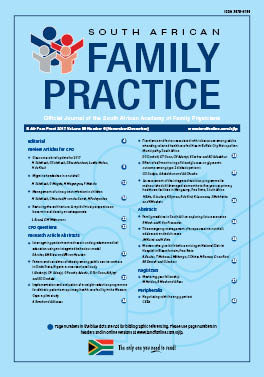Implementation and evaluation of a weight-reduction programme for diabetic patients at a primary health care facility in the Western Cape: a pilot study
Keywords:
diabetes, implementation, low-carbohydrate diet, primary health care, weight loss
Abstract
Background: Diabetes is a common non-communicable disease and complications are resulting in increased disability, reduced life expectancy and enormous health costs for virtually every society. Medical Nutrition Therapy is important for the prevention, treatment, and self-management of diabetes, and the prevention or delay in onset of diabetes-related complications. The current nutritional guidelines for diabetes state that carbohydrates should comprise 45–60% of the total nutritional intake and that lowcarbohydrate or high-protein diets offer no long-term success over healthy eating plans. Recent studies suggest that there may be merit in using low-carbohydrate diets in diabetic patients for weight reduction and improved cardiovascular markers. This study aimed to implement and evaluate a pilot programme for weight loss in diabetes mellitus type 2 patients by comparing a low-carbohydrate diet with the conventional low-fat diet. Methods: The study design was that of a two-group parallel design, with one group following a low-fat diet and the other a low-carbohydrate diet. Diabetic patients attending the Mitchell’s Plain Community Health Centre in Cape Town were recruited, with 10 participants in each group. Both groups received similar advice on exercise and behaviour change. Changes in weight, waist circumference, blood pressure and blood parameters (creatinine, lipids and HbA1c) were recorded at baseline and again after 12 weeks. Results: There were reductions in weight (1.85 kg vs. 0.1 kg gain) and HbA1c (1.72 vs. 0.32) in the low-carbohydrate diet group when compared with the low-fat diet group. No significant change was seen in other parameters including BP, total cholesterol and serum creatinine for either group. Conclusion: Low-carbohydrate diets may be effective in promoting weight loss and improving glucose control in diabetic patients. Implementation of this programme would require a paradigm shift for staff and further studies to assess its acceptability for patients. (Full text of the research articles are available online at www.medpharm.tandfonline.com/ojfp) S Afr Fam Pract 2017; DOI: 10.1080/20786190.2017.1329490
Published
2017-12-05
Section
Research Articles
By submitting manuscripts to SAFP, authors of original articles are assigning copyright to the South African Academy of Family Physicians. Copyright of review articles are assigned to the Publisher, Medpharm Publications (Pty) Ltd, unless otherwise specified. Authors may use their own work after publication without written permission, provided they acknowledge the original source. Individuals and academic institutions may freely copy and distribute articles published in SAFP for educational and research purposes without obtaining permission.

